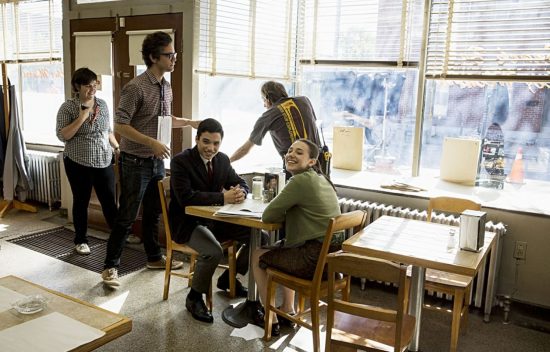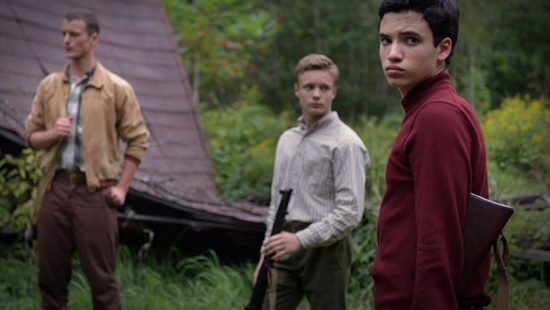Death & Revolution: Mathieu Denis talks about Corbo
“A difficult aspect of being a writer and director is that I don’t work in TV or commercials, so you don’t get to exercise your craft that often,” observes Mathieu Denis who is based in Montreal. “You get on a set and everybody has more experience than you because the crew does five or six films a year whereas you do a film every three years. Every occasion you get to exercise your craft you learn every day.” Making movies in Quebec is added by prevalence of the French language. “Canadians have their own identity but the Americans do these huge films with huge budgets with megastars who people all around the world know and then they release these films in Canada. It’s an extremely tough competition for Canadian cinema because when they come out with their own films the budgets are much smaller, and the actors and directors are less known. It becomes this David versus Goliath type of thing whereas in Quebec the language barrier works for us in this case because we have our own star system. There are known French actors and directors so there is attention to all of this and it brings people to the theatres.”
“I was troubled with this idea of a 16 year old kid joining the FLQ, going out with a bomb and dying from it,” explains Mathieu Denis when discussing the origin of Corbo. “The problem sometimes with period pieces is that they become anecdotal because you talk about something that happened at some point and it has no relevance in today’s world. But I thought Jean Corbo’s story had relevance in today’s world, especially, from a Quebec point-of-view. The fact that he was from a mixed background, half-Italian half-Québécois, was interesting to me because I had this feeling that Jean didn’t fit in anywhere. His political commitment to some extent was part of the construction of his own identity; at some point Jean had to find out who he was and what he believed in. The FLQ offered him something like that. Why is that relevant today? Quebec right now is going through the same identity crisis. After two referendums the Québécois decided that they didn’t want Quebec to become a country.” Despite the electoral result the Canadian identity was not embraced. “A lot of people in Quebec still think, ‘We’re not a country but we’re not exactly Canadian. We’re different from the rest of Canada.’”
“Some people are getting the sense that I’m saying that violence is the way to go with the film which is not what I’m saying,” remarks Mathieu Denis. “In the beginning I thought this going to be a film stating that violence should not stand. Let’s use democratic means to advance our political ideas. It’s not that clear cut. I loved reading Albert Camus when I was researching the film because a huge amount of his work revolves around the morality of using violence for any cause. Le Justes [1949] which is The Righteous in English was a theatre play that he wrote about Russian anti-royalty activists who were extremely violent. Coming from Algeria he was going through all of these questioning at the time. What he said and I have to agree with him on this is violence cannot be in itself the way to go but we can’t be angelic and think that violence never stands. The better example you can give of that is the French Resistance during World War II. At some point when you have a regime that is violence in itself there is no other way to fight it than with violence.”
No storyboards were created for the production. I take the plan of a room and mark the different places where I think the camera should go taking in account if it is going to be a wide shot or a close-up or if there is going to be this dolly move,’ states Mathieu Denis. “I want to be able to react to the reality of shooting because you might have planned something well but then something happens and you have to respond to it. I would send the camera placement map over to Steve Asselin [cinematographer] a few days before each shoot and he’d look at it. When we got to the actual scene to shoot we would do blocking. We’d try the way it was thought about and then react. There was a lot of back and forth between Steve and me at this point while we were shooting.” Shots are allowed to linger such as a three minute one which occurs just after Jean [Anthony Therrien] sets the bomb and it explodes. “Jacques [Simon Pigeon], the guy who drove him, is outside of his truck smoking a cigarette and then he hears the explosion. Jacques hears the sirens and the police car chases by; he goes back and leaves with the truck. I thought this was interesting because as a spectator of the film you don’t know exactly what happened to Jean. You don’t know if he died or escaped. You’re in the same state as the character of Jacques.”
Unlike other coming-of-age stories where the teenage protagonist becomes entangled in a love triangle, Corbo follows a different narrative path. “I didn’t want people to feel that Jean got entangled in all of that only because he fell in love with this girl,” explains Mathieu Denis. “Of course Jean is 16 years old, he’s with a girl and there’s another guy around. We had to feel some kind of a tension between those three but at the same time I didn’t want him to fall in love with a girl. One of the other reasons was that an interesting part of Jean’s story is that he died so young and what happens when you die at that age? The tragic aspect of Jean’s story is not what he had done but are all of the things he’ll never get to experience. If he had lived maybe he would have fallen in love with Julie [Karelle Tremblay]. Maybe there would have been something there but Jean died too early for this to happen and for anything else for that matter.”
“Since it was my first solo feature the funders had to take a leap of faith,” states Mathieu Denis. “When you do a contemporary film you need extras, you can call some friends and tell them to get dressed in any way. But when you need 80 extras like when Jean dies you have to get clothes for these people and cut their hair. It takes a lot more planning and manpower to organize, and it costs a lot more money. It’s the same thing with all of the sets. I wanted to go outside but then you have to find a place that seems like it was around in 1966. But if you move the camera by 5 cm it doesn’t work anymore because there’s this modern building.” Invisible visual effects are used throughout Corbo. “When Jacques and François [Antoine L’Écuyer] are riding on the motorcycle you have cars on the street. Those cars are CGI. I was doubtful that it would work but when I saw the first test I said, ‘Okay, we can go this route.’ After the explosion when Jean dies everything that you see like the flames and the building that’s destroyed, all of this is CGI. We removed a huge number of lamp posts and hundreds of graffiti on walls that did not exist at the time.”
“I had this fear with the subject of the film having this local aspect that it wouldn’t crossover to an audience outside of Quebec,” confides Mathieu Denis. “Then I arrived at the Toronto International Film Festival and there’s this mini buzz around the film. The screenings are sold out. I’m meeting with journalists and they’re talking about the film. There’s a real discussion about the subject matter that’s going on. I’m so happy with this. It’s a pleasant surprise. I didn’t expect it in many ways. You make a film because there’s a story you want to tell and think is interesting but you also make a film because as with any other artwork you want to share something with people. Film takes on its true meaning when viewed by someone else. If I’m the only one who sees my film it doesn’t have relevance.” A delicate balance needed to be maintained. “I did another film [Laurentie] that I co-wrote and co-directed and it’s an art house film times 100. The challenge with this particular case was to try to make a film that has a social meaning but at the same time can be seen by a mainstream audience.”
“I felt a moral obligation to Jean Corbo because the fact that he died so young in such a tragic way,” reveals Mathieu Denis. “I wanted to give his story meaning. To give it meaning it had to be shared with people.” Denis adds, “One thing that I thought was inspiring from Jean and his colleagues as well is that these people had convictions and clear political ideas. But most of all they had this impression that they had the power to change the world in which they were living which is something we have lost to a certain extent. I come from a generation of cynicism and of people who are not interested in politics; they have this impression that everything has been done and tried. We can’t change the world. I’m not saying that we should use the same actions as Jean and his colleagues did but we should find inspiration in this idea that we can change the world in which we’re living. This is the inspiring aspect of Corbo that we don’t get to talk about that much but I hope that people will get out of it.”
Trevor Hogg is a freelance video editor and writer who currently resides in Canada; he can be found at LinkedIn.











